In case you were wondering :)
When I read the title of Andrew Keen's book "The Cult of the Amateur: How Today's Internet Is Killing Our Culture and Assaulting Our Economy" a few months ago my attention was immediatelly cought. Somebody actually had the nerve to claim that the 2.0-isation of the world is causing the end of our civilisation. The comments spoke about a controversial and thought provoking book, so it didn't take long before I was on www.azur.be to buy the book.
When it landed on my doorstep a few days later I was immediatelly fascinated. Well written, some intelligent ideas and the writer raised a number of subjects I have been feeling uncomfortable with for some time. Like for example "How can one be sure that what's in Wikipedia is accurate?"
But once you get past the first page, the only strong point left is "well written". The remainder of the book basically collects all kind of things going wrong in the world, to then find a way to blame the internet for that. And that then leads to the conclusion that because consumers have found back their voice and power (through the internet as a means of communication) will lead to the end of the civilized world.
My conclusion: a lot of bullshit! But this is mainly a missed opportunity to start a conversation about real problems. Nobody disagrees that it is rather annoying when a person with bad intentions uses his people-power to change history in Wikipedia to his own advantage, or when a good blog is messed up with useless comments of a frustrated idiot.
The heart of the matter is that thanks to the new means of communication that the internet has given us, everybody can now do what used to be the privilege of mass media or people with a lot of money. The advantage back in the days was that those (mass media & rich people) were limited in numbers, so you always knew where stuff came from. Newspapers in Belgium used to be a nice example of that, "De Morgen" was made by left-wingers and De Standaard was written by conservative catholics. Today those lines have blurred, but more importantly, a lot of sources of information have been added. Blogs and podcasts, Youtube, Wikipedia and even that e-mail about a girl gone missing of which you do not know whether it's another hoax or not.
The problem is that most of these new sources are anonymous. You know who wrote a blogpost, but comments are often written without leaving a trace. The controversies about Wikipedia always go back to some anonymous nitwit who has adapted an article or an ambitious student pretending to be a Harvard professor.
Remember the internet fuckwad theory? That's what it's all about:
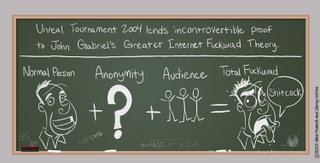
So the solution is simple, in theory that is. For years discussions have been going on about an "identity layer" that is missing on the internet. Everybody can surf and communicates as good as anonymously. Although an IP address allows for identification, in practice it can hardly be used. And no matter how many times we log into all kinds of websites, it takes five minutes to create yourself a new identity. Your home banking tool may be secure, but a Facebook or Hotmail account is fixed in no time without real verification of who you are.
If there would be one or more generally accepted system that allow users to identify themselves once, to the be "logged in" automatically no matter where you go, then we would no longer surf anonymously. So you come to a new site, and immediately get all kinds of extended features that now require you sign up once again. And if people can surf fully identified with the same comfort as they do today anonymously, it'll be so much easier to build rich platforms for interaction.
A lot of people have been working on this idea, and the most interesting idea for managing identity I found is OpenID.
Identity is the key to a flourishing 2.0 society where communication is open and free. Oh and the book, don't buy it.
Technorati Tags: Identity
The elegant golf club of Oudenaarde is not exactly the place where you go to check out new gadgets, unless you're looking for a set of golf clubs. But yesterday I walked into the bar and one of our members (Patrick) was demonstrating his iPhone to Philip (the head pro). Rather an unusual sight in the traditional setting of the castle bar :)
Anyway, the phone works perfectly on the Proximus network, only disadvantage is that you have to rely on WiFi for high speed internet access. The iPhone has GPRS and Edge, but Proximus only offers GPRS and 3G, so it's either GPRS or WiFi.
Which hack to use?
Some research learned me there is a working software hack, but that is not available for broad use yet. Patrick used the hyper card trick and that works perfectly, as I have felt with my own fingers. The idea is to mix two SIM cards, the AT&T one that comes with the iPhone (no need to have an AT&T subscription, just the SIM card) with your local provider's SIM Card. It seems to be rather easy to do with this hyper card. You have to cut out parts of each SIM card and mix the together in the hyper card. So no need to break the iPhone open.
Update:
Anybody know whether this iphone software hack really works?
Update 2:
iUnlock
Technorati Tags: puppy, Apple, Proximus, iPhone
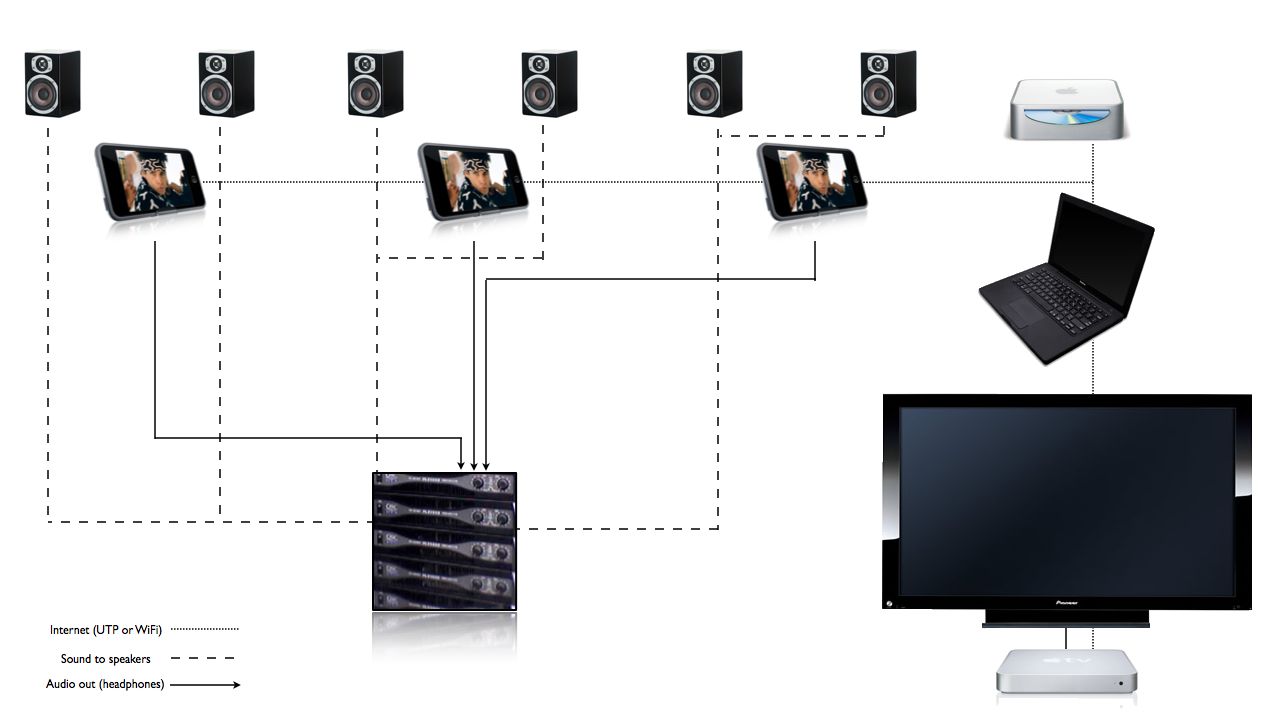
When we reconstructed our house a few years ago, we included all kinds of wiring for top of the line centrally controlled home stereo. However, for a number of reasons we never installed anything fancy. The main show stopper (apart from price) was that I wanted my iTunes collection to be accessible, and then the only real answer is Apple. The Apple TV is a first step, but that doesn't give me access to music in the kitchen or bath room.
With the launch of the iPod Touch however, we now have an elegant streaming device with a most fancy touch screen. The disc space is not even needed, I can store all my music on my desktop Mac Mini (with 500 Gb extra disc). An iPod Touch anywhere in the house has to be connected to an amplifier (in the basement) and that amplifier is in turn connected back to speakers up in the room where the iPod Touch is. We already have wires for the speakers installed, I just need to add a cable from the earphones out to the amplifier. The music is streamed over WiFi, so if the dock looks a bit elegant this could just be the most sophisticated looking home stereo setup at an acceptable cost (if you compare it to a typical Bose multi-room system). And there's no real limit to the number of installations. Each room needs an iPod Touch (€ 299), speakers (depends on the quality you want) and an amplifier (these can be expensive).
Cool! I think I'll start with the kitchen as I can use the existing mini stereo which holds an amplifier and speakers.
Kris Hoet pointed me towards TouchGraph. This neat tool visualizes Google search results for linked blogs. Seems like a great visual way to illustrate the importance of linking in Google for your pagerank.
Today we're moving, so I should be dragging boxes rather then blogging. To involve our customers as much of possible we're using Mogulus to broadcast live what's happening through a number of laptops. Everybody can follow on the ONE Agency homepage or here:

While I was reading "the world is flat" at the hairdressers, it came to my mind that Google is building a data center in Belgium. The location is quite near to where I live (found that quickly thanks to Google and Belgeoblog), so I thought this would be a great excuse for a motorbike trip. After lunch I headed south with clear sky's (well, kind of) and no Harley's in sight. Destination was Baudour, a sleeping village in the not-so-affluent "Borinage" region. That's a part of Belgium where we used to have coal mines, now it's the kind of place where a Ford Capri is a cool second hand car rather than an old timer.
 So the mission was to find the construction site of the new Google data center, and snap a few pictures to share with my readers. A pleasant little trip of about 65km of country roads brought me (past the Chateau de Beloeil) to Baudour. The industrial park Ghlin-Baudour Sud was easily found. One trip around the estate and it was clear which part was the Google site, an official paper on a tree confirmed my thoughts: A permission for Crystal Computing to construct an information technology complex. Crystal Computing being the cover-company to keep Google anonymous for some time.
So the mission was to find the construction site of the new Google data center, and snap a few pictures to share with my readers. A pleasant little trip of about 65km of country roads brought me (past the Chateau de Beloeil) to Baudour. The industrial park Ghlin-Baudour Sud was easily found. One trip around the estate and it was clear which part was the Google site, an official paper on a tree confirmed my thoughts: A permission for Crystal Computing to construct an information technology complex. Crystal Computing being the cover-company to keep Google anonymous for some time.
 The site is guarded, which is not standard in Belgium, so I had to stop by the side of the road to make a few pictures. And here is the result. Maybe I'll make this a regular trip every few months so you can follow the construction works. I'm not much of a photographer, nor a photoshopper, but hey, you get the idea don't you?
The site is guarded, which is not standard in Belgium, so I had to stop by the side of the road to make a few pictures. And here is the result. Maybe I'll make this a regular trip every few months so you can follow the construction works. I'm not much of a photographer, nor a photoshopper, but hey, you get the idea don't you?
One more thing. Apparently the proximity of a canal for cooling water was a criterion for selecting this location. Well, there's enough to cool a nuclear power plant here :)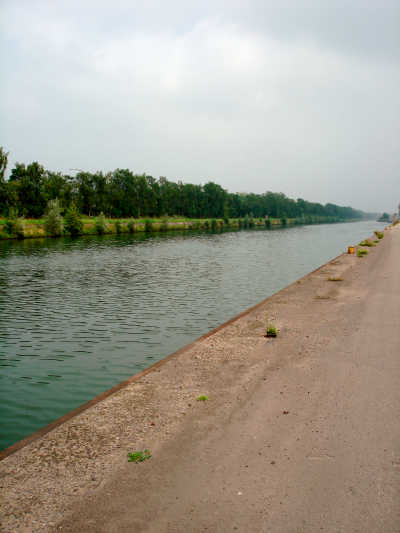

These days there's a "back to school action" for Het Laatste Nieuws. Pretty straightforward: collect points and get an MP3 player. Now like most cheap MP3 players this one kind of looks like an iPod. The action is heavily pushed on TV, so my daughter knows it by hart.
When I got home today, she was utterly disappointed. After taking a closer look she 'discovered' it a 'fake' iPod, and only holds 40 songs. So how does she think about the action and the brand? "Het Laatste Nieuws are imposters!" (Het zijn bedriegers)
One more critical consumer from the Participation Generation that is not tasting the traditional marketing approaches ...
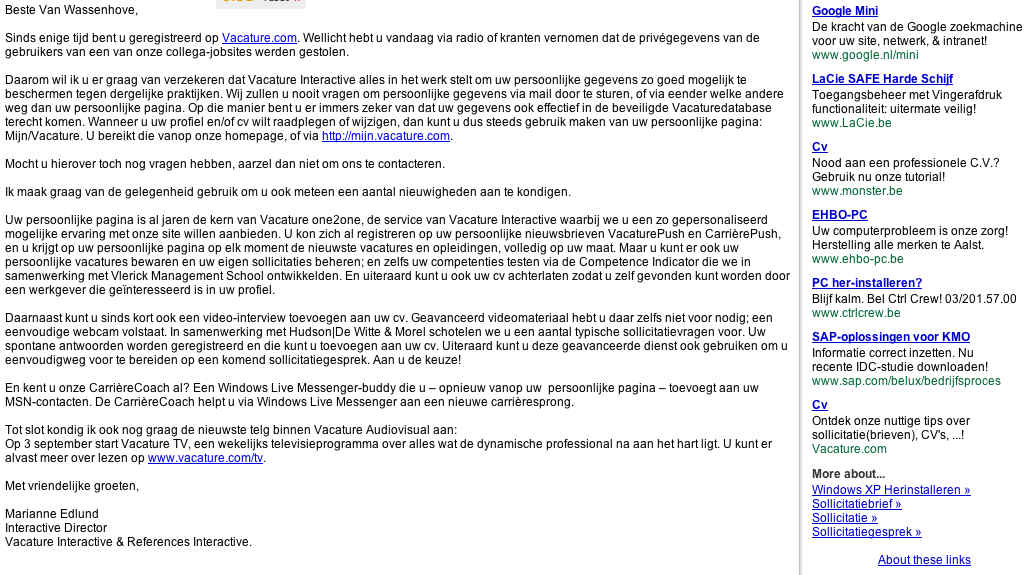
I just received the above mail (click it to enlarge). After the recruiting site Monster was in the news today because internet criminals abusing their brand to phise for bank account number, Vacature.be seizes this questionable opportunity to promote their boutique.
Competition in the recruitment market is fierce, I know, but this goes too far if you ask me.
A small comforting fact for Monster.be ... their Google Adwords ad appeared next to the Vacature.be mail in my mailbox :)
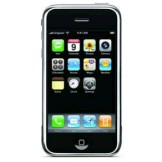
France, UK and Germany seem to be the first countries where there is a deal with Telco operator writes Data News.
Interesting fact is that apparently Apple gets 10% of the revenue from the Telco's. What an innovative product strategy can do for a company. I wonder however how they are going to sell the iPhone in Belgium with our "koppelverkoop" law (in Belgium phones and subscriptions can not be sold together in one package with one subsidizing the other).

Hey Erik, what's up with this? (Tom, I could saved you some research work as Erik is an ex-colleague of mine and I know his family)
Anyway, cool spoof on what's (not) happening with our new government. But indeed Tom, why made by CDnV's agency ... ?
I'm proud to be down to less then 97kg, in spite of holiday and lot's of parties with lot's of red wine (no beer). I'm afraid I've consumed my 'one glass a day' until the end of the month. And still I'm losing weight, which means my motivation to be 'strict' is going down.
Anyway, the target is still 90kg, and I've started doing sports again. So I may just get there.
On the other hand, a blog does not really feel like the perfect medium for this "social losing weight" thing.
Twitter is probably better, so you can 'confess' your sins 'live' or report straight from the bathroom, and who knows maybe even ask for advice when confronted with a dilemma.
Other, more sophisticated, option is Facebook. There are a number of apps that help you in keeping track/share your weigh loss progress. But that feels like a bit too much attention, losing weight is not like the most important thing in my life.
I've always been very cautious about recommending companies to go into Second Life, although my occasional public performances on the subject may indicate something else. And now that Second Life has been declared dead by the media just as quick as they made it a hype ... I have a contrary view again.
But rather then explaining my point of view, I'm going to send you off to Neville Hobson's blog who has perfectly summarized the current status of Second Live.
Thanks Neville, no other sources needed :)
Nice little test:
BBC Reports: Shadows are being used by Japanese researchers as an non-intrusive way for friends to stay in touch.
Called Teleshadow the system pipes video of what people are doing at home via the net to their friends' houses. But instead of showing images in full motion and colour, Teleshadow turns them into shadow outlines projected on the inside of a small decorative lamp.
Hat tip to Eric
After I (and lots of more bloggers) got framed by Quechup, a number of influential bloggers linked to my post. An this is the result, my post scores higher in Google then the Quechup site itself:
That's what happens if you mess around with innocent bloggers.
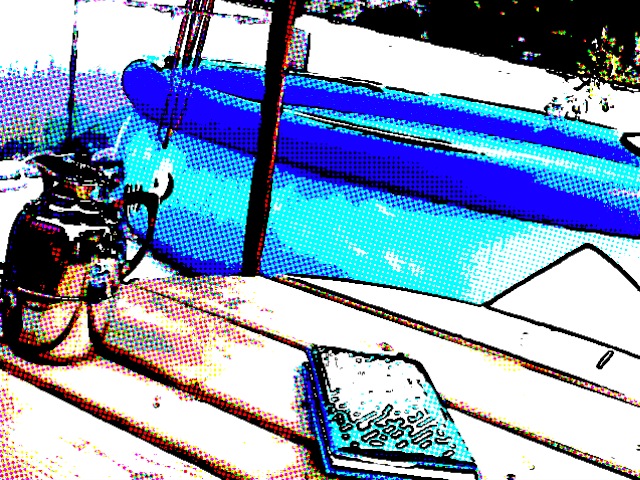 (for readers in a hurry ... start at paragraph 4)
(for readers in a hurry ... start at paragraph 4)
Back from holiday I was flooded with work, opportunities, fun and very little time for blogging. But on this sunny Sunday afternoon, floating in the pool I was thinking about advertising agencies and what differentiates one from the other.
At ONE Agency we've succeeded in claiming a piece of the interactive agency territory in only a few months time. More or less everybody agrees we are a different agency. I've heard that remark from several people, customers, colleagues and competitors. In fact it was a mail from an advertising professional I got this morning that triggered my thinking, so we are different ...
Well, of course we are. We know a bit about marketing, so we think it's crucial to differentiate from competition. However, what we do different is not the result of careful strategic consideration but from what we truly believe in. And I'm convinced this is the only good way to build a company. Go for something you believe in. And either you're very lucky (which is rare), or you are a genius (even more rare) or you have gathered enough knowledge so what you believe in is also the right thing to do. I personally have been filling up my brain through different jobs, listening to intelligent people, reading books and enjoying life in a true "Blink-style" for some years now, and I have the feeling I'm starting to understand some things. Like ... what advertising agencies should be doing in this age of consumer 2.O. They should become New Marketing Agencies.
And one of the things these new marketing agencies should do is build media. Last century agencies had to help customers choose which medium to use, today we have to help them build their own media. And this is one of the things we seem to have a good view on at ONE Agency. Result is that we get solicited quite often by media-companies who are in a constant struggle with themselves these days.
Now, what do I mean with building media? For starters, when I speak about "media", I mean interactive media, as I'm convinced these will be the only ones left soon. A website is a medium, but obviously it needs to be a real platform for interaction. Something that looks more like a medium we all know is internet radio. Today one can launch a brand radio online with a limited investment. It could be in the shape of streaming radio (like www.humoradio.be) or podcasting. We have at least 4 customers/prospects who are actively working on internet TV. Again such a 'station' can take many shapes, from a simple set of movies to download, over video podcasts to something to the likes of Joost. A last medium to me are all the games and contests agencies organize today. In fact these the branded versions of TV Game shows, but interactive this time.
Not every company or brand has the leverage to build a complete medium of their own. But most successful new media sites offer features to build your own branded experience there. It could be a myspace page or a channel on YouTube or simply a blog on blogspot ... and lots of that is for free.
So where are the 'traditional' media in all of this (and I consider the portal sites as traditional media)? I think they really have to carefully consider their position. Look at what their strengths are, look at the future and decide to go for a vision that will keep up in the coming years (so not just take your strengths and translate them to something digital). If they don't, the traditional media will be overtaken by brands and marketeers, if they do, brands and marketeers will start seeing them as allies in their quest for interaction and engagement with customes.

Back in the office an cleaning my mailbox I ran into an invite for "Quech*p" today. Ah, another social network I think and quickly check it out. One feature is to check who in you address book in in Quetchup, I try it and the system says > no contact present.
The whole thing was not very user friendly so I decide to leave it for what it is. I go back to my mailbox and see about 100 out of office replies ... apparently Quechup sent out invitations to join to my complete Gmail address book :(
THIS IS NOT FUNNY!
KILL QUECHUP FOR THIS (and sorry if you got an invite, I was not meaning to send it.
Update: I'm not alone :(
How to survive the attack of the killer Quechup @ bnox.be
Quechup : NOT what social should be @ Werner.be
Quechup Sucks and violates privacy ! @ x-tend.be
Hold the Quechup @ sparehed.com
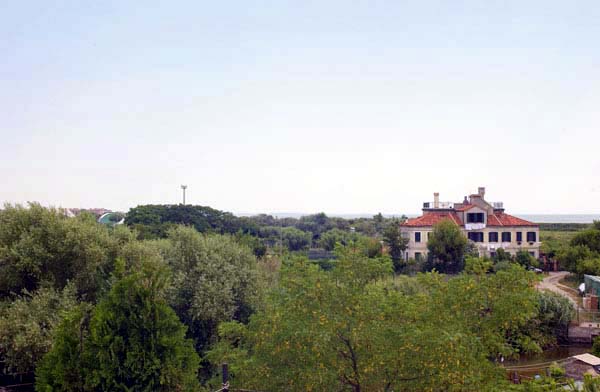 I'm off on holiday today, to VENICE for a week and then we go "somewhere in France" (suggestions for Chambre d'hotes are welcome) by motorcycle (BMW K1200RS).
I'm off on holiday today, to VENICE for a week and then we go "somewhere in France" (suggestions for Chambre d'hotes are welcome) by motorcycle (BMW K1200RS).
Last year I had an ambitious out of office message quoting all the books I planned to read. This year I again have a number of books like one I never finished (The world is flat, A brief history of the twenty-first century), and old golf book (Golf in the Kingdom) and a 100% personalized book I got (printing on demand) where the main characters got my and my wife's names (even on the cover).
But my out of office message will be different, something along the lines of: If you miss me ... listen to some cool summer festival music on www.humoradio.be.
Ciao!
